Dovedale is owned by the National Trust and farmed with many sheep on the rocky slopes and in the woods. Dovedale is one of Derbyshire's finest and most popular dales. It is little more than 3 miles distance between Thorpe to the south of the dale and Milldale in the north with the famous part being the wooded ravine between the stepping stones, a short distance from the car park at the front of Thorpe Cloud and the cave like Dove Holes. Dovedale's stepping stones appear on thousands of post cards and the area attracts a million visitors a year. Keep away on sunny weekend afternoons.
Many of the rocks in Dovedale used to be parts of active coral reefs. Flowing water aided by rain and wind has eaten away the softer limestone. In some places caverns or arches have been formed, in others where the harder rock has offerred more resistance to erosion, huge crags or pinnacles have been left projecting from the sides of the valley. Lichens cover parts of them but for the most part they stand out bare, grey and massive. Many have been named.
Upstream from the stepping stones, the heights on the left are known as Dovedale Castle and these are followed by the Twelve Apostles, best viewed from the grassy spur called lovers leap, possibly named after a rejected maiden threw herself off the precipice but was saved by the bushes that broke her fall. It is believed she spent the rest of her life in perpetual seclusion.
Following the path the walker passes the upraised fingers of the Tissington Spires and the geological oddity of Reynards cave, high on the eastern bank. This massive detached arch of rock was the mouth of a cavern until the roof fell in. It is named after one Reynard , a local brigand who made the cave his refuge. The ascent to the cave can be dangerous as one irish dean who tried to go up on horseback found out. He was out riding with a young lady friend when the horse slipped and all 3 tumbled down the slope. The dean died from his injuries and lies buried at Ashbourne.
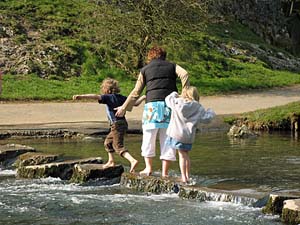
Dovedale |
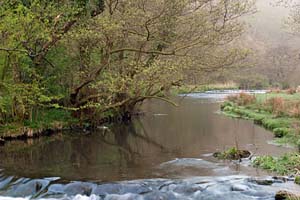
Dovedale |
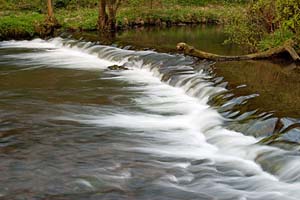
Dovedale |
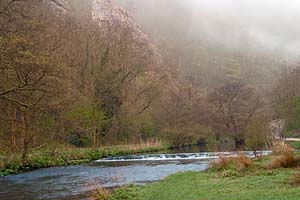
Dovedale |
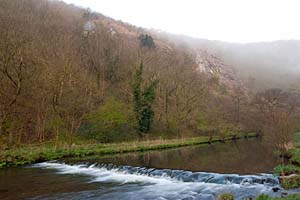
Dovedale |
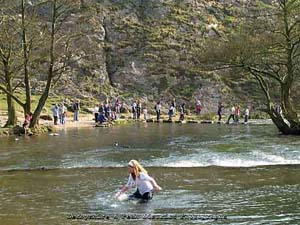
Dovedale |

Dovedale |
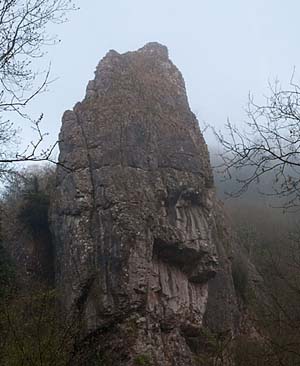
Dovedale |
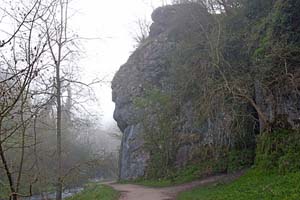
Dovedale |
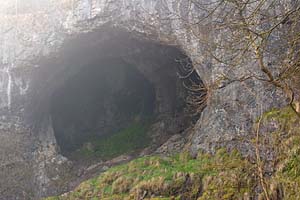
Dovedale |
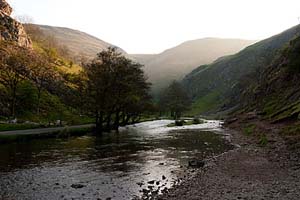
Dovedale |
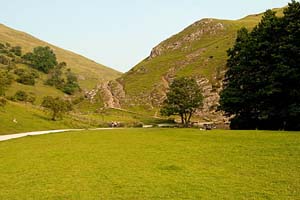
Dovedale |
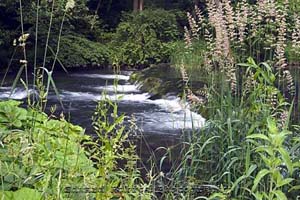
Dovedale |
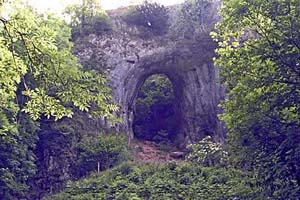
Dovedale |
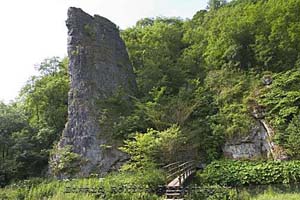
Dovedale |
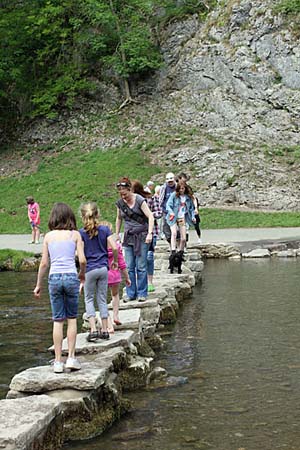
Dovedale |
The path then passes beneath the Lions Head Rock, so named because of its likeness to the king of the beasts and onto Ilam rock which rises sheer from the waters edge. Pickering Tor on the right is like a natural fortress.
Dovedale gorge itself ends where the river swings east. Here are the crags known as Ravens Tor as well as the Dove Holes, 2 caves hollowed out when the water level was higher. These are the last show pieces of Dovedale gorge. The larger of the 2 caves is some 60 feet wide and 30 feet high. Though this marks the end of the gorge, Dovedale continues for a further mile upstream to Milldale where the river is crossed via viator bridge, a honey pot for tourists.
All along the route watch out for dippers. They bob up and down perched on the lower tree branches and rocks and then dive into the water looking for food. You might also see the odd kingfisher or even a heron. Wild flora abounds with stitchwort, dogs mercury, forget-me-nots and lilies everywhere.
The Dove has many literary associations the most famous of whom is perhaps Izaak Walton, best known for his instructive book `The Complete Angler` or `The Contemplative Mans Recreation`. It remains the authoritive work on fly fishing. Another literary figure was Charles Cotton who in 1681 produced a laudatory poem called `The Wonders of the Peak`. These 2 men gave dovedale its initial reputation which has encouraged generations of visitors to seek out the idyllic enchantment that Dovedale can provide, even to this day.
Directions for Dovedale
For the southern entrance to Dovedale, take the A515 out of Ashbourne towards Buxton and after a couple of miles take a left turn sign posted Ilam, Thorpe,Dovedale. The road passes infront of the heights of Thorpe Cloud and Bunster Hill and just over the bridge crossing the river dove, an access road leads past the entrance to the Izaak Walton Hotel and onto a public car park for visitors to Dovedale.
Information from the National Trust
Parking and arrival
Due to a lack of signal infrastructures in the Dovedale and Ilam Park areas, we can only accept cash for car parking so please being the correct change with you, £3.50 for up to 4 hours and £5 for all day. National Trust members park for free but please remember to bring your cards with you to scan at the machines or show to a member of staff at Dovedale car park and then display a ticket in your car window.
There is no need to book your car parking space but please be aware that spaces become very limited on weekends, bank holidays and school holidays by 9am. Please park safely and responsibly and only park in designated car park spaces and not on roads or grass verges. All access points and roads must be kept clear for farm tenants, local communities and the emergency services.
(National Trust) Ilam Park car park is open from 8:30am until dusk - no overnight car parking allowed. £3.50 FOR UP TO 4 HOURS AND £5 FOR ALL DAY. NT MEMBERS PARK FREE WITH PROOF OF MEMBERSHIP CARD.
(National Trust) Dovedale car park is open from 9am until 7:30pm - no overnight car parking allowed. £3.50 FOR UP TO 4 HOURS AND £5 FOR ALL DAY. NT MEMBERS PARK FREE WITH PROOF OF MEMBERSHIP CARD.
If you find that an area is very busy, please have an alternative place to visit planned and do not be tempted to park or queue on narrow roads or grass verges.
The vital funds raised in National Trust car parks help to directly support their conservation work across the Peak District, from planting trees that help to tackle climate change, to increasing the diversity in wildflower meadows. For more FAQs around parking across National Trust sites, please visit their central page here
The toilets in Dovedale are looked after by the Peak District National Park Authority and have a charge of 20p, so please bring change with you.
For the love of Dovedale
National Nature Reserves are open to the public, and we welcome our visitors to enjoy them freely whilst looking after this special place that you love to escape to.
If you love Dovedale then please follow our guidance for a visit that is enjoyable but respectful of the landscape at the same time:
BBQs/campfires/outdoor cooking equipment (stoves/free standing BBQs) are not allowed anywhere in the Peak District National Park as they are a severe health and safety risk to the landscape and to people. If you see a fire get to a safe place and dial 999 and give location details.
‘Wild camping' (anywhere outside of designated camp sites) is only allowed with landowner permission, and the majority of landowners in the Peak District do not allow this. There's also no wild camping allowed on National Park Authority land or National Trust land. To avoid disappointment, we encourage anyone wanting to camp, to plan ahead and book in at a campsite. To book in at a campsite you can visit the Pitchup website which lists all the different campsites across the UK.
Dogs on leads at all times is required when exploring any National Nature Reserve. This helps to protect the wildlife that lives there from disturbance and also is safest for you, your dog and other people exploring the area.
Take all the litter that you brought with you home. Issues of access, emptying and servicing make the provision of bins extremely costly and our charitable resources, as well as staff and volunteer time is very limited. We have some incredible staff and volunteers who are picking up litter each day across our different Peak District sites. You can help look after the places you love to visit, by taking all your litter home when bins aren't available. This includes dog mess, tissues, wipes, nappies, shoes, picnic blankets etc. Fly-tipping is against the law and you can face hefty fines for doing so.
It is safest for you and for nature that you stick to footpaths as you could easily disturb the home of animals that live in these areas, as well as delicate wildflowers, vegetation, insects and amphibians.